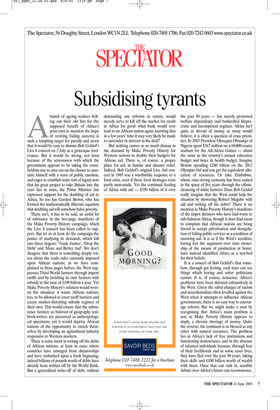Subsidising tyrants
Abunch of ageing rockers belting out their old hits for the supposed benefit of Africa’s poor (not to mention the hope of reviving fading careers) is such a tempting target for parody and scorn that it would be easy to dismiss Bob Geldof’s Live 8 concert on 2 July as a grotesque irrelevance. But it would be wrong, not least because of the seriousness with which the government appears to be taking the event. Seldom one to miss out on the chance to associate himself with a wave of public emotion, and eager to establish some sort of legacy now that his great project to take Britain into the euro lies in ruins, the Prime Minister has expressed support for the doubling of aid to Africa. So too has Gordon Brown, who has formed the mathematically illiterate equation that doubling aid will somehow halve poverty.
There isn’t, it has to be said, an awful lot of substance in the two-page manifesto of the Make Poverty History campaign, which the Live 8 concert has been called to support. But let us at least do the campaign the justice of analysing its demands, which fall into three slogans: ‘Trade Justice’, ‘Drop the Debt’ and ‘More and Better Aid’. We don’t disagree that there is something deeply rotten about the trade rules currently imposed upon African nations; as we have complained in these pages before, the West suppresses Third World farmers through import tariffs and by lavishing its own farmers with subsidy to the tune of £190 billion a year. Yet Make Poverty History’s solution would worsen the situation: it wants African nations, too, to be allowed to erect tariff barriers and create market-distorting subsidy regimes of their own. This would ensure that the subsistence farmers so beloved of geography textbook-writers are preserved as anthropological specimens, yet it would deprive African nations of the opportunity to enrich themselves by developing an agricultural industry responsive to Western markets.
There is some merit in writing off the debts of African nations, at least in cases where countries have emerged from dictatorships and have embarked upon a fresh beginning; indeed billions of pounds worth of debts have already been written off by the World Bank. But a generalised write-off of debt, without demanding any reforms in return, would merely serve to kill off the market for credit in Africa for good: what bank would ever lend to an African nation again, knowing that in a few years’ time it may very likely be made to surrender its interest in the deal?
But nothing causes us so much dismay as the demand by Make Poverty History for Western nations to double their budgets for African aid. There is, of course, a proper place for aid, in famine and disaster relief. Indeed, Bob Geldof’s original Live Aid concert in 1985 was a worthwhile response to a food crisis, even if those food shortages were partly man-made. Yet the continual feeding of Africa with aid — £550 billion of it over the past 50 years — has merely promoted welfare dependency and bankrolled kleptocratic and incompetent regimes. Africa isn’t quite as devoid of money as many would believe; it is often a question of crass priorities. In 2003 President Olusegun Obasanjo of Nigeria spent $347 million on a 60,000-seater stadium for the All-Africa Games — about the same as the country’s annual education budget and twice its health budget. Imagine Britain spending £240 billion on the 2012 Olympics bid and you get the equivalent allocation of resources. Or take Zimbabwe, whose once-strong economy has been ruined in the space of five years through the ethniccleansing of white farmers. Does Bob Geldof really imagine that the West could help the situation by showering Robert Mugabe with aid and writing off his debts? There is no mention in Make Poverty History’s manifesto of the tinpot dictators who have laid waste to sub-Saharan Africa, though it does find room to complain that African nations are being forced to accept privatisation and deregulation of failing public services as a condition of receiving aid. It is as if the West’s socialists, having lost the argument over state ownership of the means of production at home, have instead identified Africa as a test-bed for their beliefs.
It is a conceit of Bob Geldof’s that somehow, through gut feeling, rock stars can see things which boring and sober politicians cannot. It is, of course, nonsense: Africa’s problems have been debated exhaustively in the West. Given the rabid charges of racism and neocolonialism often levelled against the West when it attempts to influence African governments, there is no easy way to encourage reform. But we might make a start by recognising that Africa’s main problem is not, as Make Poverty History appears to imply, a chronic shortage of money. Quite the reverse; the continent is as blessed as any other with natural resources. The problem lies in Africa’s lack of free institutions and functioning democracies, and in the absence of talented individuals because, through fear of their livelihoods and in some cases lives, they have fled over the past 30 years, taking their skills and £100 billion worth of wealth with them. Once that can sink in, sensible debate over Africa’s future can recommence.


















































 Previous page
Previous page